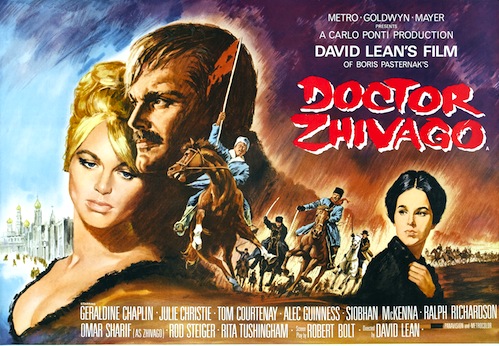
One of the most famous censored pieces of literature in the post Second World War era is Dr. Zhivago, a work by author Boris Pasternak about the life of a family during the Russian Revolution in the early part of the 1900s. Smuggled out of the USSR and taken to Italy for publishing, the story is critical of the early Soviet era, and resulted in it being banned during the Soviet era at the same time as earning international acclaim. The story focuses to some degree on the rapid collectivization of Russian society at the time of the Revolution from the perspective of a Doctor in Moscow. When his home is filled with other citizens and their family receive veiled threats by newly minted government Commissars, they make they journey to their Dacha, or second home in the far east of Russia. Dealing with the onset of Communism in a more contested part of the country, the Doctor and his family fight to survive in the reality of the new regime.
Much of the criticism from inside of the Soviet Union, one registered only by the government and hidden from the citizens of the Soviet state, was that Dr.Zhivago shows the Soviet system in a negative light. The reality was that tyranny was a large part of life in Russia at the time and still existed at the time the book was published. A true account of what life may have been like in the process of collectivization of the nation had to be censored, as the truth, that of a loss of rights and often life would undermine their political power.
There are many lessons to be learned from the Doctor and author Pasternak as well, mostly aimed at how free societies should repel any movements towards a Soviet style system, and how that style of top down government control can easily turn into a tyranny. These lessons are as relevant today as ever, and while no system is perfect nor can claim that justice is always paramount in the application of the law, the ability to fight and seek justice without the threats of violence or being ostracized from society needs to be preserved in order to have a free society with free citizens. The alternative, according to Pasternak, is always bad for individual citizens. When power is held by a few, it will never be equally distributed in a system that allows a concentration of that power. In Pasternak’s experience, Absolute Power certainly Corrupts, and the best of us are not able to protect ourselves, our family or even our lives.
If you live in a place where a large entity or corporation has disproportional power, you must take steps to create equality of justice. If your government wants to take more control of you without precedent or for the valid public good, you must take steps to ensure your voices are being heard. If you take the time to vote, but your government does things to limit your voice or your elected representative’s vote in your legislature, parliament, congress or local council, you must acknowledge it and demand your democracy remains sacrosanct. If your news and media is censored to protect any government and similar actions as those above, then they are not media, they are an arm of a system to protect those from being accountable to equality and justice. Tyranny always produces a strong response in the long term, as those without a democracy, justice or freedom have nothing to lose. Those who have freedoms but claim they have nothing to lose are often those who are seeking power, not equality nor justice, and not for the individuals of their community.